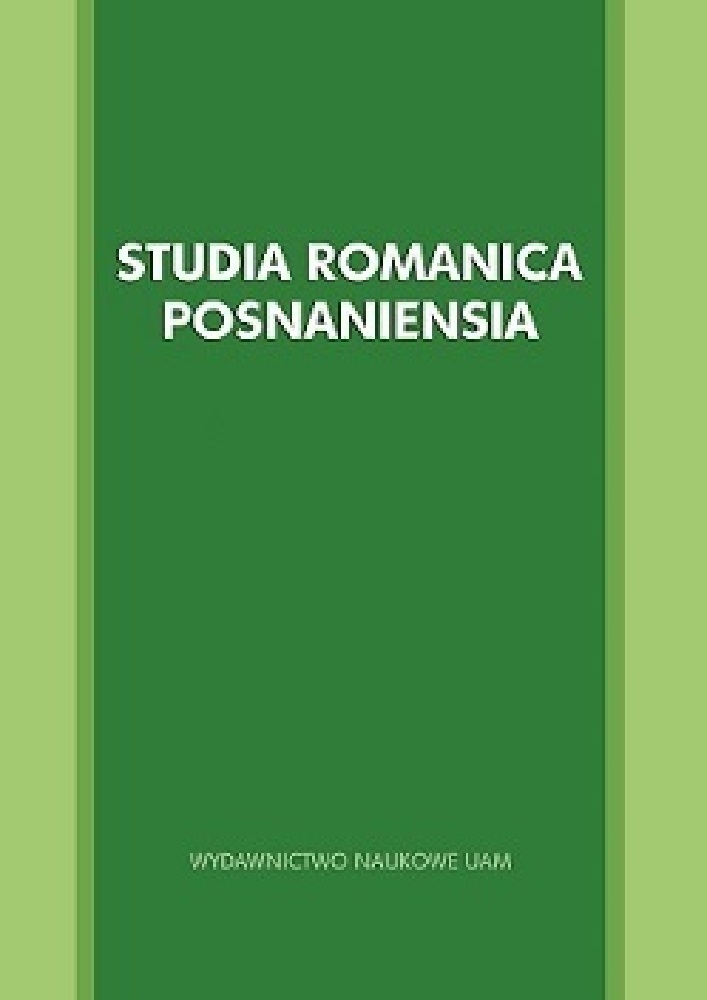Abstrakt
This text is an attempt to discuss the affective dimension of the experience of the city in three novels by the Brazilian writer and composer Chico Buarque. In Estorvo (1991) the protagonist is unable to create bonds with the urban space and his perception of the city is a blend of actual observation and his delirious subjectivity. In Budapeste (2004) the main character is experiencing the capital of Hungary as an affective representation of the actual place. In Leite derramado (2009) the narrator is organising his story through affective memories of significant places.
Bibliografia
Almeida, S.R.G. (2015). Mobilidades culturais, geografias afetivas: espaço urbano e gênero na literatura contemporânea. In R. Dalcastagnè, V.M. Vasconcelos Leal (Eds.), Espaço e gênero na literatura brasileira contemporânea (pp. 15-39). Porto Alegre: Zouk.
Anderson, D. (2017). Affective Topographies: Landscape and Subjectivity in the Work of Patrick Keiller, W.G. Sebald and Iain Sinclair. London: University College London.
Borowski, G. (2012). Identidades perturbadas num distúrbio pós-moderno: Estorvo de Chico Buarque. In R. Díaz-Szmidt (Ed.), Identidades revisitadas, identidades reinventadas: transformações dos espaços sociais, políticos e culturais nos países de língua oficial portuguesa (pp. 153-171). Varsóvia: Muzeum Historii Polskiego Ruchu Ludowego; Instytut Studiów Iberyjskich i Iberoamerykańskich UW.
Buarque, Ch. (1991). Estorvo. Lisboa: Dom Quixote.
Buarque, Ch. (1997). Benjamim. Lisboa: Presença.
Buarque, Ch. (2008). Budapeste. Alfragide: Leya.
Buarque, Ch. (2009). Leite derramado. Alfragide: Dom Quixote.
Buarque, Ch. (2014). O irmão alemão. São Paulo: Companhia das Letras.
Certeau, M. (1998). A invenção do cotidiano: artes de fazer (trans. E. Ferreira Alves). Petrópolis: Vozes.
Etymonline (2019). Affect. In Online Etymology Dictionary. Retrieved April, 29 from https://www.etymonline.com/word/affect.
Jo, J.Y.O. (2018). Homing: An Affective Topography of Ethnic Korean Return Migration. Honolulu: University of Hawai’i Press.
Leys, R. (2011). The Turn to Affect: A Critique. Critical Inquiry, 37, 434-472. DOI: http://doi.org/10.1086/659353.
Massumi, B. (1995). The Autonomy of Affect. Cultural Critique, 31, 83-109. DOI: http://doi.org/10.2307/1354446.
Nader, L. (2014a). Afekt. In M. Saryusz-Wolska, R. Traba (Eds.), Modi memorandi: leksykon kultury pamięci (pp. 31-33). Warszawa: Scholar.
Nader, L. (2014b). Afektywna historia sztuki. Teksty Drugie, 1, 14-40.
Nogueira, R.C. (2005). Fragmentos urbanos imaginados. Testos e Pretextos, 7, 60-71.
Nycz, R. (2014). Afektywne manifesty. Teksty Drugie, 1, 9-13.
Peres, A.M.C. (2016). Conversa com Chico Buarque. In Chico Buarque: recortes e passagens (pp.189-208). Belo Horizonte: Editora da UFMG.
Rybicka, E. (2006). Geopoetyka (o mieście, przestrzeni i miejscu we współczesnych teoriach i praktykach kulturowych). In M.P. Markowski, R. Nycz (Eds.), Kulturowa teoria literatury: główne pojęcia i problemy (pp. 471-490). Kraków: Universitas.
Silva, F.B. (2004). Chico Buarque. São Paulo: Publifolha.
Thrift, N. (2004). Intensities of Feeling: Towards a Spatial Politics of Affect. Geografiska Annaler, 86, 57-78. DOI: http://doi.org/10.1111/j.0435-3684.2004.00154.x.
Walker, I. (2002). City Gorged with Dreams: Surrealism and documentary photography in interwar Paris. Manchester/New York: Manchester University Press.
Licencja
- Autor oświadcza, że przysługują mu osobiste i majątkowe prawa autorskie do Utworu oraz że nie są one ograniczone w zakresie objętym niniejszą Umową, oraz że utwór jest dziełem oryginalnym i nie narusza majątkowych lub osobistych praw autorskich innych osób.
- Autor udziela Uniwersytetowi im. Adama Mickiewicza w Poznaniu niewyłącznej i nieodpłatnej licencji na korzystanie z Utworu bez ograniczeń terytorialnych i przez czas nieokreślony na następujących polach eksploatacji:
2.1. wytwarzanie określoną techniką egzemplarzy Utworu, w tym techniką drukarską, reprograficzną, zapisu magnetycznego oraz techniką cyfrową;
2.2. wprowadzanie do obrotu, użyczenie lub najem oryginału albo egzemplarzy Utworu;
2.3. publiczne wykonanie, wystawienie, wyświetlenie, odtworzenie oraz nadawanie i reemitowanie, a także publiczne udostępnianie Utworu w taki sposób, aby każdy mógł mieć do niego dostęp w miejscu i w czasie przez siebie wybranym;
2.4. włączenie Utworu w skład utworu zbiorowego;
2.5. wprowadzanie Utworu w postacie elektronicznej na platformy elektroniczne lub inne wprowadzanie Utworu w postaci elektronicznej do Internetu, Intranetu, Extranetu lub innej sieci;
2.6. rozpowszechnianie Utworu w postaci elektronicznej w Internecie, Intranecie, Extranetu lub innej sieci, w pracy zbiorowej jak również samodzielnie;
2.7. udostępnianie Utworu w wersji elektronicznej w taki sposób, by każdy mógł mieć do niego dostęp w miejscu i w czasie przez siebie wybranym, w szczególności za pośrednictwem Internetu, Intranetu, Extranetu lin innej sieci;
2.8. udostępnianie Utworu zgodnie z wzorcem licencji Attribution-NonCommercial-ShareAlike 4.0 International (CC BY-NC-SA 4.0) lub innej wersji językowej tej licencji lub którejkolwiek późniejszej wersji tej licencji, opublikowanej przez organizację Creative Commons. - Autor zezwala Uniwersytetowi im. Adama Mickiewicza w Poznaniu na:
3.1. nieodpłatne korzystanie i rozporządzanie prawami do opracowań Utworu i tymi opracowaniami.
3.2. wysyłanie metadanych Utworu oraz Utworu do komercyjnych i niekomercyjnych baz danych indeksujących czasopisma. - Autor upoważnia i zobowiązuje Uniwersytet im. Adama Mickiewicza w Poznaniu do udzielania osobom trzecim dalszych licencji (sublicencji) do Utworu oraz do innych materiałów, w tym utworów zależnych lub opracowań zawierających lub powstałych w oparciu o Utwór, przy czym postanowienia takich sublicencji będą tożsame z wzorcem licencji Attribution-NonCommercial-ShareAlike 4.0 International (CC BY-NC-SA 4.0) lub innej wersji językowej tej licencji lub którejkolwiek późniejszej wersji tej licencji, opublikowanej przez organizację Creative Commons Tym samym uprawnia wszystkich zainteresowanych do korzystania z utworu wyłącznie w celach niekomercyjnych pod następującymi warunkami:
4.1. uznanie autorstwa czyli obowiązek podania wraz z rozpowszechnionym utworem informacji, o autorstwie tytule, źródle (odnośniki do oryginalnego utworu, doi) oraz samej licencji;
4.2. na tych samych warunkach, wolno rozpowszechniać utwory zależne jedynie na licencji identycznej to tej, na jakiej udostępniono utwór oryginalny. - Uniwersytet im. Adama Mickiewicza w Poznaniu jest zobowiązany do:
5.1. udostępniania Utworu w taki sposób, aby każdy mógł mieć do niego dostęp w miejscu i w czasie przez siebie wybranym bez ograniczeń technicznych;
5.2. poprawnego informowania osób, którym Utwór będzie udostępniany o udzielonych im sublicencjach w sposób umożliwiający odbiorcom zapoznanie się z nimi.
Pozostałe postanowienia
- Uniwersytet im. Adama Mickiewicza w Poznaniu zachowuje prawo do czasopisma jako całości (układ, forma graficzna, tytuł, projekt okładki, logo itp.).
